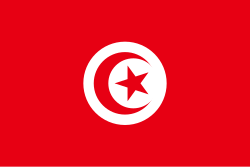This article relies largely or entirely on a single source .(November 2024) |

Tunisian nationalism refers to the nationalism of Tunisians and Tunisian culture. [1] Tunisian nationalism's origins stretch back to the 19th century; however, Tunisian nationalism became a significant political force after 1908 with the founding of the Young Tunisians movement, and the more significant Destour (Arabic for "Constitution") Party established after World War I. [1] The Destour Party called for Tunisian autonomy within the French Empire and that France should not dominate Tunisia's politics and society. [1] France responded by banning the Destour Party in 1933, resulting in the rise of a more radical nationalist party, the Neo-Destour Party being formed in 1934 led by Habib Bourguiba. [1] The Neo-Destour Party demanded independence of Tunisia from France, though it respected French and Western culture and sought to maintain close links with France after independence was achieved. [1]